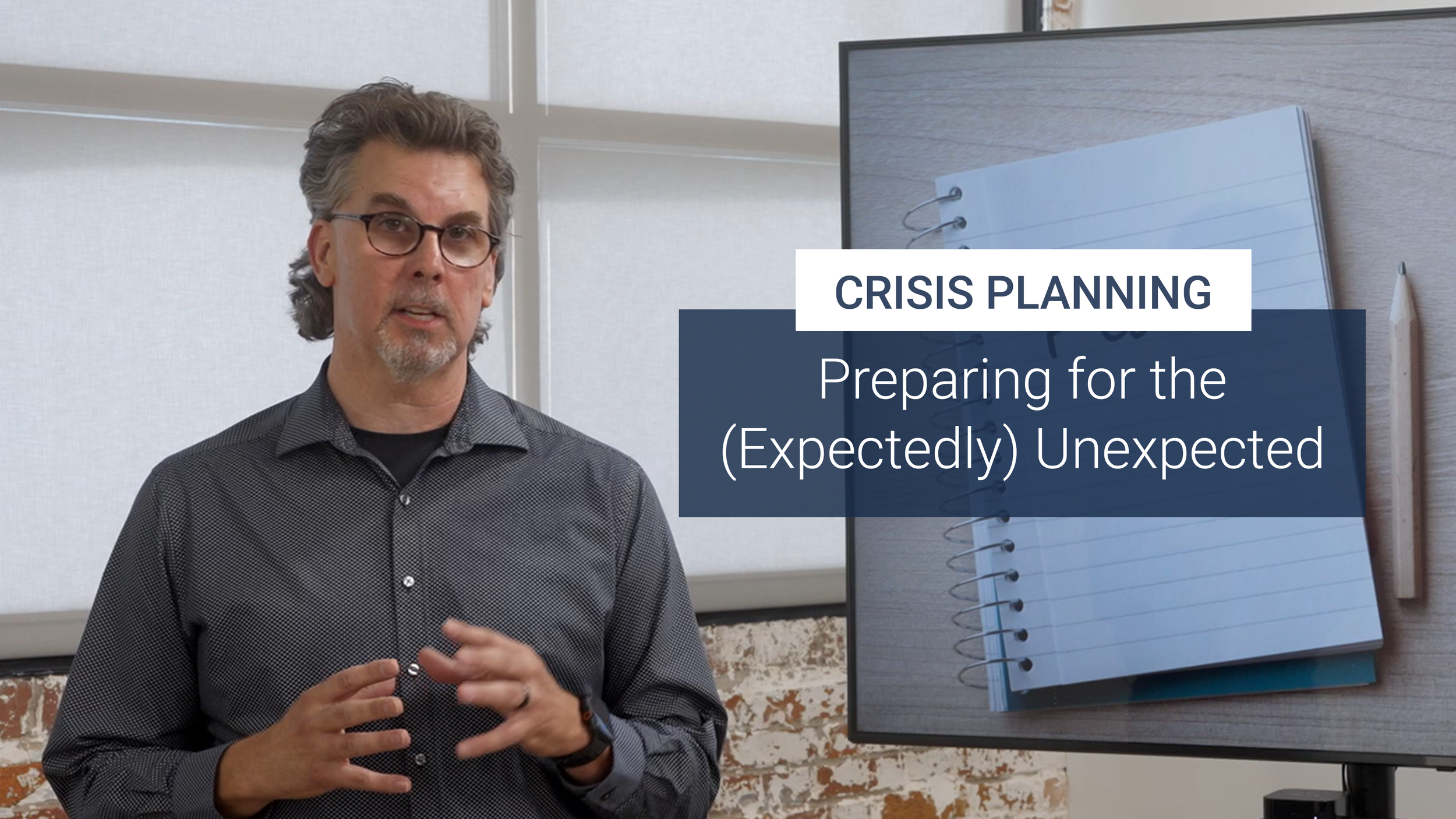Have you experienced an unexpected event in the last week, month, or year at your place of work? Chances are you have, and while most unexpected events are fairly benign and don't have much of an impact on the organization, there are some things that can happen that could be potentially devastating to your organization, even its very existence.
There are three categories of unexpected events that can occur: operational disruptions, financial pressures, and leadership challenges. And although some may be more or less applicable to your particular circumstance, the idea is to get you thinking: what are the big things in my organization that I need to be prepared for, do my best to prevent, and be able to handle if they do occur.
1. Operational Disruptions
Some operational disruptions we could experience include supply chain interruptions, a data breach or ransomware attack, or even a natural disaster or other catastrophe that prevents us from running the organization.
Operational Continuity Plan
What can leaders do amongst this doom and gloom? As part of our operational continuity plan, we can look at three specific things.
Diversify your supply chain. Be less dependent on a small number of suppliers of the key things that you need to deliver your products, goods, or services. And never, to the extent possible, have a sole supplier of anything critical that you need to run your business.
Implement strong cybersecurity measures such as data backups, redundancy, and firewalls. Conduct internal and external audits that look at your processes and how you handle your information and data to make sure that they are as protected as possible. And train your team regularly on the current cyber threats of the day so that they are more prepared to identify them and less likely to fall prey to a scheme or a scam.
Partner with others in your space, even competitors, to help you deliver your products or services to your customers and clients in the event that you are not able to do so. Many industries have trade associations with a primary focus as just this, where members band together and help each other out in a time of crisis without the fear of customer pilferage.
2. Financial Pressures
The financial pressures you may encounter are having bad debt, inventory write-offs, or the sudden loss of a large customer or client. In 2023, 9% of all credit-based business-to-business sales resulted in uncollectible losses. That is an astounding number when you extrapolate that out to the economy. And it hit very hard for me personally because I experienced this exact issue several years ago when I owned a manufacturing company.
Financial Readiness Plan
What can we do as part of our financial readiness plan to be better prepared for tough financial times?
Have accounts receivable insurance. This is a policy that is built on your business, your industry, your history, and all the associated risks. It insures you and helps you get money that you are not able to collect otherwise from your customers or clients.
Have proper cash flow reserves on hand to be able to fund your operation or business if you get into a cash flow crisis. Think about this as “Dave Ramsey” for your business. And although there is no hard and fast rule of what you should have on hand, three to six months is a good rule of thumb to have for operating expenses in a pinch.
Relentlessly grow your business. Be aggressive to get new customers and clients, and develop products and services that make you more sticky to your clients and customers and make it harder for them to leave you. Do everything you can to not fall prey to the 80-20 stat that says 80% of your business is concentrated in 20% of our customers or clients. Do not let your organization be crippled by the loss of one or two clients.
3. Leadership Challenges
Leadership challenges that you might encounter include the sudden loss or death of a CEO or key leader, a poorly executed leadership change where someone moves into a role that they are not qualified to do, or bad behavior or poor ethical decisions by a member of your management or leadership team. I found a report that showed 43% of all organizations in 2024 lost at least half their leadership team. That is an astounding number and shows the importance of attention to leadership stability.
Leadership Stability Plan
So, what can we do to create a leadership stability plan?
Delegate and make your organization less dependent upon yourself. I'm speaking especially to founders and small business owners who have people working for them. Make sure that you get what is in your brain out to them so that they are prepared to make decisions and run the organization if you are not able to.
Have disciplined, focused, and intentional leadership development and succession planning processes in place. These types of things do not come about by chance. They require attention and focus. Having intentional leadership development allows you to cultivate a pipeline of leaders who can take over when both planned and unplanned events happen.
Make sure you have strong corporate governance and culture accountability. When leadership challenges happen and people make bad decisions that reflect poorly on the organization, you need to be able to act quickly to right the situation. Send a message to your internal team that this is important to you, and contact external stakeholders who will be looking to see how you handle a situation like this.
I know not every specific situation might apply to your organization, but hopefully this stirred you to think about what you need to be prepared for to minimize the impacts when the expectedly unexpected happens.
If you would like help in these areas or other services that The Center is involved in, please give us a call. We would love to talk with you and see how we may be able to partner together. Contact us to learn more.
Michael J. Kane, MBA, is a Senior Consultant at The Center Consulting Group. During Michael’s three-decade career in both the military and civilian sectors, he has navigated a wide range of challenging situations. He has led soldiers as a Military Police Sergeant, served as President of a company with over 100 employees, acted as VP of Sales and Customer Experience for a billion-dollar company, and owned his own manufacturing business. These diverse experiences have profoundly shaped his business and leadership philosophy. Additionally, Michael has extensive experience in the non-profit sector as a Board member and Vice Chair, and he currently serves as the President and Founder of Uplifted Foundation. Michael holds a BA in Management/ Information Systems from Eastern University and an MBA in New Ventures and Entrepreneurial Studies from Penn State University.




![Developing a Successful Sales and Marketing Strategy [VIDEO]](https://images.squarespace-cdn.com/content/v1/571fc0ea1d07c0fd6d72c167/1770391559147-9Z6Q4BC1EY0R8BUHCATM/sales+blog.png)
![Gratitude: A Silver Bullet for Strengthening Morale [VIDEO]](https://images.squarespace-cdn.com/content/v1/571fc0ea1d07c0fd6d72c167/1768246672364-PQNI8VHO5EEPZ3IRMY7F/gratitude+blog.png)
![Public Speaking: Using AI Ethically & Effectively to Create a Powerful Speech [VIDEO]](https://images.squarespace-cdn.com/content/v1/571fc0ea1d07c0fd6d72c167/1763735597032-XMIKMQ1D63PRC1QJ6FVV/ai+speech+blog.png)
![Preparing for the (Expectedly) Unexpected [VIDEO]](https://images.squarespace-cdn.com/content/v1/571fc0ea1d07c0fd6d72c167/e4193bcf-29f7-46c2-be12-9116791d40cf/unexpected+blog.png)
![Fundraising: How to Raise Funds for Your Nonprofit [VIDEO]](https://images.squarespace-cdn.com/content/v1/571fc0ea1d07c0fd6d72c167/1757619882819-6OARWR0QU11M7LA0ABYL/fundraising+blog.png)
![Culture: 5 Traits That Set Healthy Churches & Their Leaders Apart [VIDEO]](https://images.squarespace-cdn.com/content/v1/571fc0ea1d07c0fd6d72c167/1755633039402-KVJFNJWG0RKBCMLS5FNB/healthy+blog.png)
![Vision: 3 Must-Have Traits of Every Successful Visionary Leader [VIDEO]](https://images.squarespace-cdn.com/content/v1/571fc0ea1d07c0fd6d72c167/1749484247758-ITEGD2LZZ716112KLHXZ/visionary+blog.png)
![Advisory Boards: Should Your Business Have an Advisory Board? [VIDEO]](https://images.squarespace-cdn.com/content/v1/571fc0ea1d07c0fd6d72c167/1747149791510-HU20SY0O8LRPEHGMC6HD/advisory+blog.png)
![Leadership: How to Be a World Class Boss [VIDEO]](https://images.squarespace-cdn.com/content/v1/571fc0ea1d07c0fd6d72c167/1744640489138-X5LUNZT3JTRQYSSZXV1C/boss+thumbnail.png)
![Conflict: The Importance of Having Tough Conversations [VIDEO]](https://images.squarespace-cdn.com/content/v1/571fc0ea1d07c0fd6d72c167/1741365599296-KTWEJ5PTNH1BX2GJ9REJ/Conversations+blog.png)
![Exit Planning: The Challenge of Business Exit Planning & Why It Matters to You [VIDEO]](https://images.squarespace-cdn.com/content/v1/571fc0ea1d07c0fd6d72c167/1738339040891-VIW87N2NCZUCKLYNOHB6/exit+blog.png)

![Teams: Is Your Team Dysfunctional? [VIDEO]](https://images.squarespace-cdn.com/content/v1/571fc0ea1d07c0fd6d72c167/1733243870005-NOI69Z74DLNVLIB8MRRJ/dysfunctional+blog.png)
![How to Recruit and Inspire Volunteers [VIDEO]](https://images.squarespace-cdn.com/content/v1/571fc0ea1d07c0fd6d72c167/1728421227208-6JAUFVXEJW5KK6YE58JR/volunteers+blog.png)
![Trust: 4 Steps to Rebuild Damaged Trust [VIDEO]](https://images.squarespace-cdn.com/content/v1/571fc0ea1d07c0fd6d72c167/1725969594417-7AN9PJO2X8TTR77ACDFP/trust+blog.png)
![Blind Spots: How to Identify & Avoid Blind Spots in Your Organization [VIDEO]](https://images.squarespace-cdn.com/content/v1/571fc0ea1d07c0fd6d72c167/1722610352594-FAXECLPC61QYJH2I5YT8/blind+spot+blog.png)
![Family Business: Will the Family Business Destroy Our Family? [VIDEO]](https://images.squarespace-cdn.com/content/v1/571fc0ea1d07c0fd6d72c167/1718027719043-MU9AYPTQ7GM4XWT9EGD1/destroy+blog.png)
![Teams: How to Breathe New Life into a Broken Team [VIDEO]](https://images.squarespace-cdn.com/content/v1/571fc0ea1d07c0fd6d72c167/1714749389916-G2CWVK8OM1JJSD9058CL/breathe+blog.png)
![Planning: The Power of Planning [VIDEO]](https://images.squarespace-cdn.com/content/v1/571fc0ea1d07c0fd6d72c167/1712597764732-WHRZPRLZ6V78CBGKBPZA/PLanning+blog.png)
![Leveling Up Your Leadership: Becoming an Effective Senior Leader [VIDEO]](https://images.squarespace-cdn.com/content/v1/571fc0ea1d07c0fd6d72c167/1710266273593-QN3HEBJ5FII4GKQFH91Q/leveling+up+blog.png)
![Recruiting & Retaining “Mature” Team Members [VIDEO]](https://images.squarespace-cdn.com/content/v1/571fc0ea1d07c0fd6d72c167/1707849950823-Y5WJLYXM6ZPU55TKG27Y/recruitment+blog.png)

![Gaslighting: How to Identify It & Take Back Control [VIDEO]](https://images.squarespace-cdn.com/content/v1/571fc0ea1d07c0fd6d72c167/1699381799669-Y6XNYG2X3ZD1US80XAFY/Gaslighting+blog.png)
![Decision-Making: Why Smart Leaders Do Dumb Things [VIDEO]](https://images.squarespace-cdn.com/content/v1/571fc0ea1d07c0fd6d72c167/1696947285846-ZIA5M26B5AF9SRFGWFPV/Dumb+Things+blog.png)

![Meeting Effectiveness: 4 Different Types of Meetings & Why It Matters [VIDEO]](https://images.squarespace-cdn.com/content/v1/571fc0ea1d07c0fd6d72c167/1690296011536-23CWWE2VJ40QJ0UA1EZY/meetings+blog.png)
![Leadership: 4 Directions You Need to Lead [VIDEO]](https://images.squarespace-cdn.com/content/v1/571fc0ea1d07c0fd6d72c167/1689105063370-WQTIN47T3TP8YXQM3RMP/directions+blog.png)
![Leadership Model: Are You a Cheerleader, Drill Sergeant, or Coach? [VIDEO]](https://images.squarespace-cdn.com/content/v1/571fc0ea1d07c0fd6d72c167/1686670057921-DJ286QE8OZOQKE22SZAL/coach+blog.png)
![Developing Women Leaders: The Power of Leader Efficacy [VIDEO]](https://images.squarespace-cdn.com/content/v1/571fc0ea1d07c0fd6d72c167/1683572272369-EJ4N7BBXL0832YUM4XUN/Women+efficacy+blog.png)
